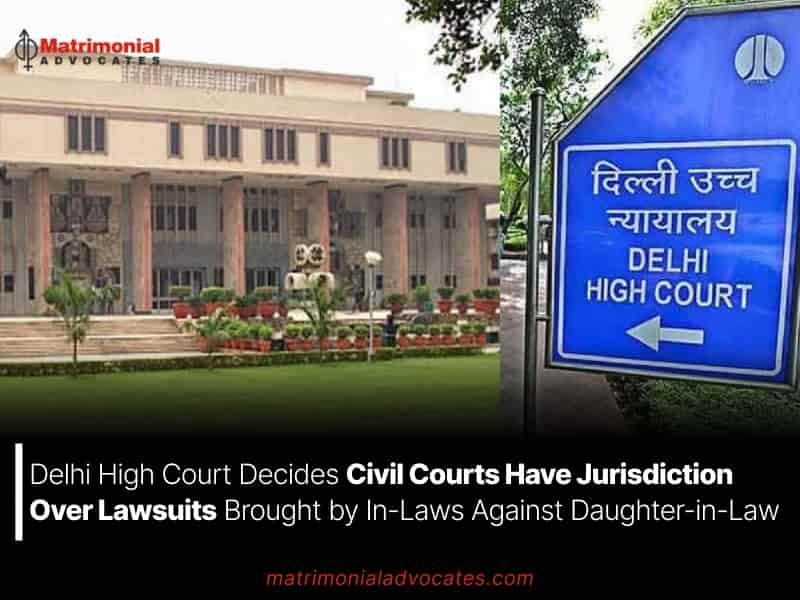
The Court emphasised that a matter would fall under the purview of family court only when the circumstances have a direct bearing on the marriage.
The recent judgment from the Delhi High Court highlights that family courts do not hold exclusive authority over civil cases initiated by in-laws against their daughter-in-law, particularly when the relief sought involves issues such as possession or injunction. In a clarification provided by the division bench, comprising Justice Yashwant Varma and Justice Dharmesh Sharma, it was stressed that such disputes fall under the jurisdiction of civil courts for resolution. The court emphasized that matters would be referred to family courts only if they directly impact the marital relationship. Additionally, the Court emphasized that rights concerning property ownership or possession are not inherently tied to the maintenance of marital bonds.
“Indeed, when it comes to a dispute as between mother-in-law and/or father-in-law on the one side and their estranged daughter-in-law on the other side, the claim of proprietorship or ownership of a property and thereby seeking relief in the nature of possession and/or injunction by its very nature incidentally indicates a matrimonial relationship, but such relationship is not a foundational fact so as to lay a claim. Such relationship is not at the core of the dispute but exists independently in civil law, and thus, the Family Courts do not exercise exclusive jurisdiction over such disputes and as an inevitable corollary the jurisdiction of Civil Courts is not barred,” the Court held.
The Court issued its verdict in reply to inquiries raised by a solitary judge who noticed a divergence of views among parallel benches regarding the authority of family courts compared to civil courts in these disagreements.
The division bench primarily tackled the question of whether claims brought by third parties such as fathers-in-law or mothers-in-law against either spouse should exclusively fall within the jurisdiction of family courts, thereby excluding civil court jurisdiction. In the case of Avneet Kaur v Sadhu Singh, a single judge had decreed that suits seeking the eviction of a daughter-in-law by her in-laws should be adjudicated before a family court, citing the fundamental role of marriage in such disputes. However, previous rulings by other judges had maintained that such suits were outside the purview of family court jurisdiction. After deliberating on arguments put forth by counsels, along with the opinions of the amicus curiae Dr. Amit George and relevant legal precedents, the Court concluded that the interpretation of ‘marital relationship’ must transcend the conventional notion of ‘family’.
“The expression, ‘marital relationship’ when bifurcated brings out that the word ‘marital’ has been defined as ‘of or relating to marriage or relations between husband and wife’ while ‘marriage’ has been defined as a ‘formal union of a man and a woman, typically as recognised by law, by which they become husband and wife’,” it explained.
Moreover, the Court emphasized that each lawsuit or legal proceeding under the Family Courts Act must specify the ’cause of action’ for its commencement, and this cause must correspond to issues falling within the ambit of family courts’ jurisdiction.
“The cause of action, in order to bring the case under the subject provision and so as to confer jurisdiction upon the family court must encapsulate a tangible averment that the dispute is one which has an intrinsic nexus with the martial relationship,” it said.
The Court stressed the importance of ensuring that the circumstances unmistakably demonstrate a direct connection to aspects crucial to the marital bond. It clarified that merely having a marital relationship between the parties, even if it’s peripheral, cannot be the sole criterion for directing proceedings to a family court. Consequently, the Court diverged from the interpretation presented in the Avneet Kaur case, which confined jurisdiction exclusively to family courts for such disputes.
“It is likely to open a pandora‟s box, which would risk inclusion of all disputes as between the parents and their married children and even siblings within its ambit,” the division bench said.
The Court concurred with the amicus’ contention “that giving precedence to the cause of action in determining the appropriate jurisdictional forum also guarantees that family courts can uphold their specialized concentration on matrimonial issues, preventing a scenario where they become overwhelmed with cases unrelated to marital relationships.”
In summary, the Court asserted that the determination of whether a claim associated with a marital relationship should be adjudicated before the family court or the civil court must be analyzed and resolved based on identifying the underlying basis of the claim.
“An assertion of a particular suit or proceeding being liable to be tried exclusively by the Family Court would succeed only if it is established that there is a direct nexus between the ‘cause of action’ and the ‘marital relationship’.”
As a result, the Court reversed the Avneet Kaur decision and adopted the differing viewpoints expressed in other judgments. Moreover, the Court clarified that the inclusion or exclusion of the husband as a party in the lawsuit filed by his parents does not solely dictate the jurisdiction of the family court.
“The joinder or non-joinder of parties would have to be considered in light of the plethora of case law which already exists on that issue. Ultimately and irrespective of whether a husband is joined or not, the jurisdiction of the Family Court would have to [be] ascertained based on the cause of action and whether that is founded on the marital relationship or has a mere casual or incidental connection to the cause,” it said.





